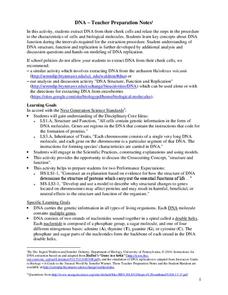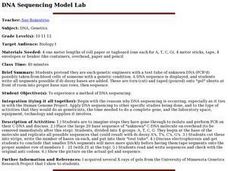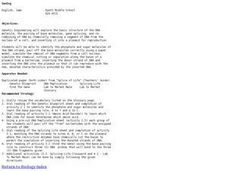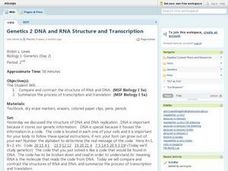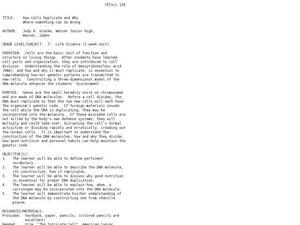Curated OER
DNA and Protein Synthesis in the Cell
Students explore how DNA fits into chromosomes and how chromosomes relate to the human body. Students learn about DNA replication and protein synthesis and model these two processes.
Curated OER
DNA and Protein Synthesis
Tenth graders work with a partner, and copies of the attached worksheet "Amino Acid Codon Table" They discuss ways an organism, obtains and uses proteins. Students view a teacher prepared DNA strand banner, and record the complementary...
Curated OER
DNA, Genes, and Chromosomes
Students review the structure and function of DNA, genes, and chromosomes and are engaged by a demonstration illustrating the relative size of DNA, genes and chromosomes. They also describe through analogy and model the structure and...
Curated OER
DNA Replication
Students construct a 3-D model of DNA. They demonstrate an awareness of base pairs in written work and in a model. Students model DNA replication using edible materials. They record concluding thoughts in their science notebooks.
Curated OER
Games and Activities to Teach Molecular Genetics
Students demonstrate a working knowledge of cell interactions such as DNA replication, protein synthesis (transcription and translation), through active participation in a cooperative group.
Curated OER
Extracting DNA from Your Cells - Teacher Preparation Notes
Students extract their own DNA from cheek cells. In this biology instructional activity, students explain the replication process. They identify the structure and composition of DNA.
Curated OER
DNA Sequencing Model Lab
Learners pretend they are each genetic engineers with a test tube of unknown DNA (PCR'd) possibly taken from blood cells of someone with a genetic condition.
Curated OER
DNA Models
Students construct paper model of the DNA molecule. In this genetics lesson, students assemble paper parts that represent nucleotides into a DNA molecule. Extension ideas are also provided.
Curated OER
DNA AND PROTEIN SYNTHESIS IN THE CELL
Learners explore the structure of DNA and the process of DNA replication, describe the process of protein synthesis, recognize the importance of proteins in the human body, and look at how mutations affect protein synthesis.
Curated OER
GenEng
Students investigate the process of genetic engineering. In this genetic engineering lesson plan, students use paper models of DNA and plasmid bacterium to investigate the process of replicating DNA, splicing genes from DNA, and...
Curated OER
Nucleic Acids and Protein Synthesis
Tenth graders complete a vocabulary assignment based on terms in the unit. They complete appropriate worksheets as each section of the unit is completed. They participate in classroom discussions. They construct a model of a DNA molecule.
Curated OER
Science Lesson: Chocolate Flavored Cherries
Young scholars are able to identify start and stop sequences in DNA. They are able to model using restriction enzyme and ligase to remove sections of DNA and reattach them. Students are introduced to the process of recombinat DNA...
Curated OER
Protein Synthesis
In this protein synthesis instructional activity, students use a given strand of DNA to write the complimentary base pairs. They transcribe the message to the RNA and then they translate the message into the proper amino acids using the...
Atkins
Attack of the Viruses!
Not all viruses are bad, but are all retroviruses groovy? The lesson starts with a detailed presentation before scholars create their own model of a virus. The resource incorporates many worksheets and practice questions to reinforce the...
Curated OER
Nucleic Acid
In this chromosome activity students complete a crossword puzzle by answering questions on DNA, nucleic acids, nucleotides and RNA.
Curated OER
How Cells Duplicate and Why Where Something Can Go Wrong
Seventh graders explore the function of a cell and cell division. In this investigative lesson students construct a 3-D model of a DNA molecule.
Curated OER
DNA and RNA Structure and Transcription
Students compare and contrast the structure of RNA and DNA.They summarize the process of transcription and translation. The instructional activity uses an inquiry model and the use of codes in DNA.
Curated OER
How Cells Duplicate and Why, Where Something Can Go Wrong
Seventh graders study cell division. They examine the role of deoxyribonucleic acid (DNA), and how and why it must replicate, is essential to comprehending how our genetic patterns are transmitted to new cells.
Curated OER
Edible DNA
Pupils use multicolored soft candies (gumdrops and candy orange slices) and toothpicks to create models of DNA structures. They discuss the fact that DNA must copy itself before splitting into two cells. Students demonstrate this by...
Serendip
From Gene to Protein via Transcription and Translation
DNA carries the codes for creating just the right protein. A well-designed lesson leads pupils through the process from start to finish and everywhere in between. Guiding questions with supporting video help scholars understand the...
Curated OER
Mitosis Cookies Activity
Reward biology learners for working hard in their mitosis lesson with a sweet snack at the end! They begin by twisting apart creme-filled cookies and using the icing as a cytoplasm. Colored candy sprinkles make up chromosome pairs, which...
Curated OER
How HIV Infects Cells
In this how HIV infects cells activity, students read the given information about how HIV infects cells. Students explain the role of various structures in HIV infection. Students design a drug that might slow the rate of cellular...
Serendip
From Gene to Protein - Transcription and Translation
Learners identify the different steps involved in DNA transcription. In this genetics lesson, pupils complete a worksheet and model the translation process with a paper chain activity. They watch a video on sickle cell anemia and explain...
Curated OER
Genetics and Molecular Biology
Students create DNA models using colored construction papers. For this biology lesson, students identify enzyme restriction sites. They model how DNA plasmids replicate when taken up by a bacterial cell.







